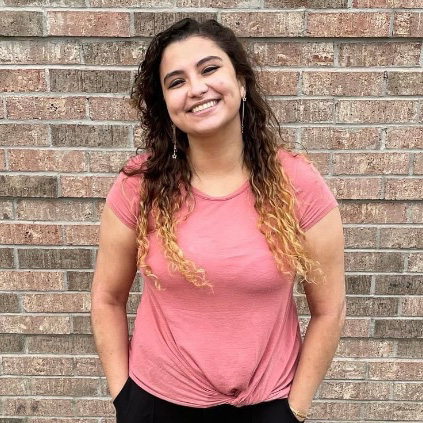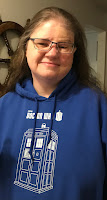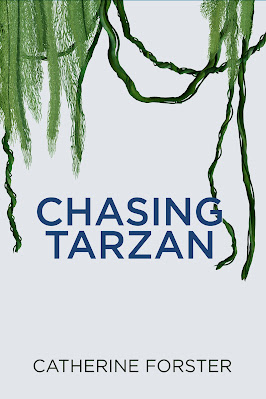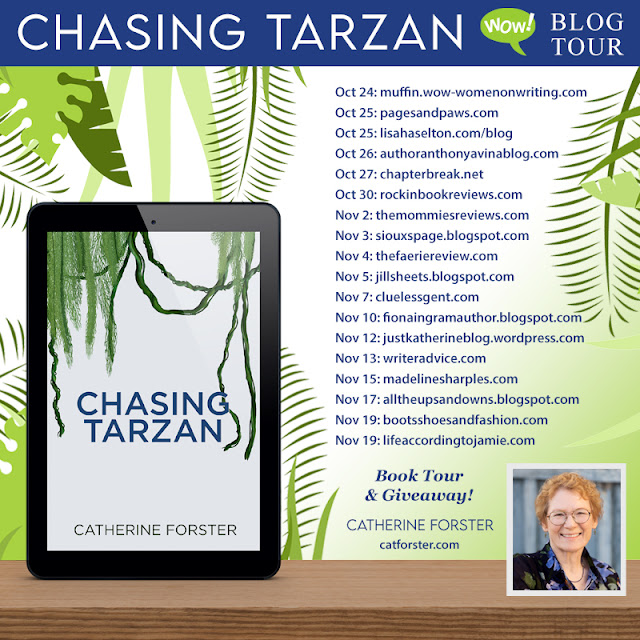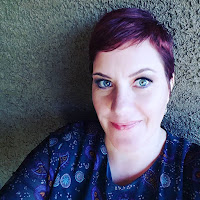---- Interview by Nicole Pyles
WOW: First of all, congratulations on your memoir Chasing Tarzan. How did your memoir change from first draft to final draft?
Catherine: My first draft was a 700-page memory dump. I thought it was a book, but my first beta reader informed me it was at least five: a coming of age story, a parenting book, a travel book, an exposé on relationships, and a cookbook! Through her kindhearted counsel I discovered that the first draft was actually research. I started over. The second draft was three-hundred pages and radically stripped down, at least I thought it was. After another round of beta readers, I wrote draft three and sent it to a professional editor. Her response was devastating, “It’s not a memoir, or even a book; it’s three books: coming of age, parenting, and relationship book.” Apparently, I’d only removed two of the five books.
When my daughter was born, I vowed she would not suffer at the hands of bullies––I would prevent it––but the bullying prevailed despite my efforts. During her twelfth year, we spent three weeks on safari in Africa. Africa awakened memories of my childhood confident and protector, Tarzan, and the bully who made my life unbearable. The manuscript shifted between Africa and my childhood memories and struggles with relationships caused by bullying. I thought draft three was a book on the long-term effects of bullying, but the editor found it to be a motley collection of experiences; well written, with a strong voice, but still not a book.
Feeling I’d embarked on a foolish journey, I put the book away, but it would not leave me alone. I re-read all the notes from beta readers and the editor, and began again. One comment by a reader stuck with me, “Why not take one storyline and dive deep, tell all of it. Don’t try and merge stories, just take one theme. When you’re done, then decide if linking the piece with another storyline is needed or if it stands alone.” I followed her advice. I chose the coming of age story, for the sole reason that reader after reader said they missed the child and the teenaged girl when she wasn’t the focus of the story. And I dove deeper than I ever thought possible, exposing incidents I’d long ago banished, tucked away in an impenetrable vault in my head. Only five chapters survived from the previous draft, but I’d found Chasing Tarzan. A further three drafts would follow, each sharpening but not altering the story.
WOW: That's profound how this story evolved and how much of yourself you put into capturing the right story. I can relate to how you developed a rich fantasy life to escape reality around you. How did that influence your pursuit of creative arts?
Catherine: Creative pursuits were natural to me from the first day I was given a crayon and told not to color outside the lines. I continued to color outside the lines, but only in my head. Growing up , I was drawn to the beauty I saw in objects, prompting me to experiment with: painting, stained glass, knitting, crocheting, macramé, beadwork, printmaking, you name it I tried it. I made stuff, however, the most creative enterprise took place in my head. My inner world was quixotic, a place where there were no boundaries, no rules, no it’s-done-like-this.
Despite a rich demonstration of artistic interests––our home was flush with my art projects––my parents did not support a career in the arts. Art was viewed as a hobby. My first degree was in Microbiology. After seven years working in hospital labs, I earned an MBA at the London Business School. This would lead to a fulfilling period in business, one replete with travel, but I wondered whether I had something to offer in the arts. I left and entered art school, earning a Masters in Fine Arts. This is the career I was always meant to have, yet there is a synergy with my earlier endeavors. I used a lens at the beginning and still do, exchanging a microscope for a camera. Moreover, every undertaking has been about solving puzzles, discovering what lies beneath the surface. My writing, my visual art projects, and my films are all a search for answers, discover the facets of cause and effect.
"One comment by a reader stuck with me, 'Why not take one storyline and dive deep, tell all of it. Don’t try and merge stories, just take one theme. When you’re done, then decide if linking the piece with another storyline is needed or if it stands alone.' I followed her advice."
WOW: I'm so glad you found your way to back to the arts! This memoir of yours is truly a story about overcoming obstacles. What do you hope readers take away from reading it?
Catherine: In the beginning, I wrote the book so that my daughter would not feel alone in her struggle with bullying. I wanted her to know what she was experiencing was abuse, treatment she did not deserve. My writing group helped me recognize the universal themes of the book. Through them, I decided to write for a broader audience.
Like many children, perhaps you too, I was told that bullying was a fact of life, part of growing up, that one would be stronger for it. Studies show this is not the case. Individuals who were the target of severe bullying (whether physical or verbal) are more likely to struggle with their relationships, suffer from depression, addiction, and suicide during adulthood. Moreover, the abuse doesn’t stop when the tormentor stops. In the process of writing Chasing Tarzan, I learned that I became my own bully. Once I moved to another school and left my bully behind, his shadow followed me. He had trained me well. The sound of his voice echoed even in his absence.
I did not want this for my daughter, or anyone’s child. I know through personal experience and recent studies agree, that the abuse need not define an individual if they know they are loved and are undeserving of the abuse. It is my hope that young readers will know that there are positive options available to them, and that they do not have to resort to self-medication or other dire actions.
As I wrote Chasing Tarzan, I discovered that despite being left to my own defenses, I was not entirely alone. A champion can ebb the long-term effects of bullying. Someone who believes in you, stands up for you, validates you’re worthy of love––deserving of nothing less––can make all the difference. My adult readers have given me hope that the book will create advocates I call angels. Several readers who are teachers have requested this book for their school, and their school counselors. The book resonates with mothers raising children, and with women rethinking their own childhood story. I am humbled by the discoveries they’ve shared with me.
WOW: I am so glad that this has reached so many others and helped them. What was your writing process like when working on your memoir?
Catherine: I am an early morning writer. I start at 6AM, sometimes earlier, before the world intrudes. I begin by reading. I like to start my writing sessions with good sentences and vibrant words in my head. So as not to be overly influenced by one writers voice, I read at least three books and am conscious in doing so, studying choices the author is making. Next, I read my own work, starting with the previous chapter. This usually requires a bit of editing, which further immerses me in my own characters and their universe.
I do not write in a coffee shop or public space. I need absolute silence. No music. No overheard talking. I can stand a leaf blower outside, but not for long. I have a room in my house that is quiet, the surroundings calm––no clutter. I write in a guest bedroom not my studio, that’s for art making. As I read, I sit in a comfortable chair and use a lap desk to write on my MacBook.
I write until it’s 11:30 or noon, have lunch, then go for a walk. It is in nature that I resolve writing issues, or arrest fresh ideas. I return to the book, but only briefly, jotting down ideas or fixing perplexing problems. I have learned that this is not the time to write, my brain has had it by then. For me, it’s time to reflect. I’ll take notes on my iPhone, but nothing else. Not until I’m back in my writing chair the following morning.
"A champion can ebb the long-term effects of bullying. Someone who believes in you, stands up for you, validates you’re worthy of love––deserving of nothing less––can make all the difference."
WOW: I am a bit similar to you in that noise can distract me! What are you working on now that you can tell us about?
Catherine: I’m writing a work of fiction, Sorry Cakes for Supper. The story alternates between the main character Judyth’s week with her granddaughter and to flashbacks of Judyth’s childhood, beginning in 1914 and ending in 1920 when she meets her future husband Ed. The journey takes her from a joyful child to a reticent adult, yet it is the course of one week spent with her granddaughter that is most life-changing.
Approaching her fiftieth birthday, time is playing tricks on Judyth’s mind. Most days, she suppresses the memories of a secret daughter and the death of a subsequent child she had with her Ed. She is content with the life she has created, where emotions are kept at arm’s length, until her son shows up on her doorstep and deposits his six-year old daughter. The child has stopped talking for no apparent reason. Her distress and ghost-like presence shatter Judyth’s carefully crafted world.
Writing fiction is a new world to me. I am on my fourth draft, and have weathered bewildering and hard-hitting critiques from my editor. Thanks to writing Chasing Tarzan, I am accustomed to tough criticism. I am learning the nuts and bolts of fiction from the ground up. It’s exasperating and exhilarating. Writing is rewriting!
WOW: It absolutely is! Thank you so much for talking with us today. I can't wait to read your next book too.
---- Blog Tour Calendar
October 24th @ The Muffin
Join us as we celebrate the launch of Chasing Tarzan by Catherine Forster. We'll be interviewing the author, sharing information about the book, and hosting a giveaway.
October 25th @ Pages and Paws
Join the Pages and Paws blog and read the review of Chasing Tarzan by Catherine Forster.
October 25th @ Lisa Haselton's Reviews & Interviews
Join Lisa as she interviews author Catherine Forster about her book Chasing Tarzan.
October 26th @ Author Anthony Avina's Blog
Visit Anthony's page and read his review of Chasing Tarzan by Catherine Forster.
October 27th @ Chapter Break
Join Julie as she shares a guest post by Catherine Forster about the role of imagination when children suffer torment.
October 30th @ Rockin Book Reviews
Join Lu Ann as she reviews Chasing Tarzan by Catherine Forster.
November 2nd @ The Mommies Review
Join Glenda as she reviews Chasing Tarzan by Catherine Forster and hosts a giveaway on her blog.
November 3rd @ Sioux's Page
Visit Sioux's blog as she reads and reviews Chasing Tarzan by Catherine Forster.
November 4th @ The Faerie Review
Join Lily as she reviews Chasing Tarzan by Catherine Forster.
November 5th @ Jill Sheets Blog
Jill interviews Catherine Forster about her memoir Chasing Tarzan.
November 7th @ Clueless Gent
Join Michael as he reviews Chasing Tarzan by Catherine Forster.
November 10th @ Word Magic
Come by Fiona's blog and read a guest post about the mother-daughter relationship in all its complexities.
November 12th @ Just Katherine
Katherine shares her thoughts about Chasing Tarzan by Catherine Forster.
November 13th @ Writer Advice
Catherine Forster shares a guest post about how her idea for her memoir came to be and how she turned it into a novel.
November 15th @ Choices
Madeline shares a guest post by Catherine Forster about the long-term effects of bullying.
November 17th @ All the Ups and Downs
Join Heather as she features a guest post by Catherine Forster about the role of adults and how they can be the potential savior for the wounded child.
November 19th @ Boots, Shoes and Fashion
Join Linda as she interviews author Catherine Forster about her book Chasing Tarzan.
November 19th @ Life According to Jamie
Jamie shares her thoughts about Chasing Tarzan by Catherine Forster.
***** BOOK GIVEAWAY *****
Enter to win a copy of
Chasing Tarzan by Catherine Forster by filling out the Rafflecopter form below. The giveaway ends November 6th at 11:59pm CT. We will announce the winner in the Rafflecopter widget the next day and follow up via email. Good Luck!


